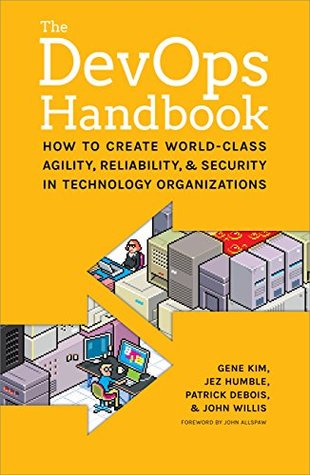More on this book
Community
Kindle Notes & Highlights
by
Gene Kim
Read between
September 9 - October 9, 2017
Find Innovators and Early Adopters: In
In the next phase, we seek to expand DevOps practices to more teams and value streams with the goal of creating a stable base of support.
Identify the Holdouts: The “holdouts” are the high profile, influential detractors who are most likely to resist (and maybe even sabotage) our efforts.
DevOps transformations is that they are inevitably in conflict with ongoing business operations.
“Without these self-service Operations platforms, the cloud is just Expensive Hosting 2.0.”
Bill Baker, a distinguished engineer at Microsoft, quipped that we used to treat servers like pets: “You name them and when they get sick, you nurse them back to health. [Now] servers are [treated] like cattle. You number them and when they get sick, you shoot them.”
What enables this system to work at Google is engineering professionalism and a high-trust culture that assumes everyone wants to do a good job,
Therefore, whenever we find an error with an acceptance or integration test, we should create a unit test that could find the error faster, earlier, and cheaper.
we have an architecture that is too tightly-coupled, where strong separation between our module boundaries no longer exist
In her 2013 presentation at Flowcon titled “On the Care and Feeding of Feedback Cycles,” Elisabeth Hendrickson observed, “Although testing can be automated, creating quality cannot. To have humans executing tests that should be automated is a waste of human potential.”
This system worked without a lot of formality or policy—everyone knew that our job was not just ‘write code,’ but it was to ‘run a service.’
we must have integrated, tested, working, and potentially shippable code, demonstrated in a production-like environment, created from trunk using a one-click process, and validated with automated tests.”
“The secret for going from zero to seventy million users overnight is to avoid doing it all in one fell swoop.”
The Art of Monitoring,
The Knight Capital failure is one of the most prominent software deployment errors in recent memory.
“Ask a programmer to review ten lines of code, he’ll find ten issues. Ask him to do five hundred lines, and he’ll say it looks good.”
If accidents are not caused by “bad apples,” but rather are due to inevitable design problems in the complex system that we created, then instead of “naming, blaming, and shaming” the person who caused the failure, our goal should always be to maximize opportunities for organizational learning, continually reinforcing that we value actions that expose and share more widely the problems in our daily work. This
The better question to focus on is, ‘Why did it make sense to me when I took that action?’”
Dr. Amy C. Edmondson, Novartis Professor of Leadership and Management at Harvard Business School and co-author of Building the Future: Big Teaming for Audacious Innovation, writes: Again, the remedy—which does not necessarily involve much time and expense—is to reduce the stigma of failure. Eli Lilly has done this since the early 1990s by holding ‘failure parties’ to honor intelligent, high-quality scientific experiments that fail to achieve the desired results. The parties don’t cost much, and redeploying valuable resources—particularly scientists—to new projects earlier rather than later can
...more


